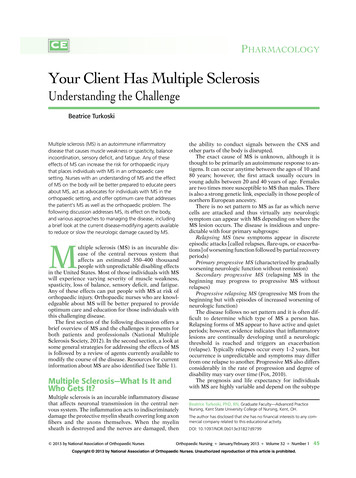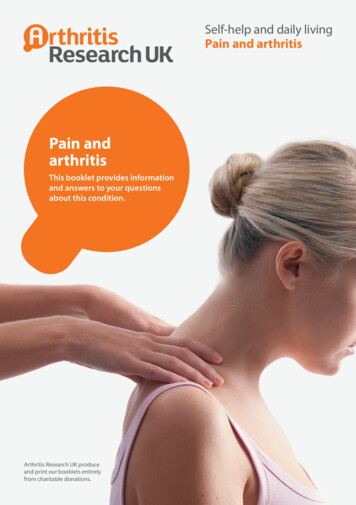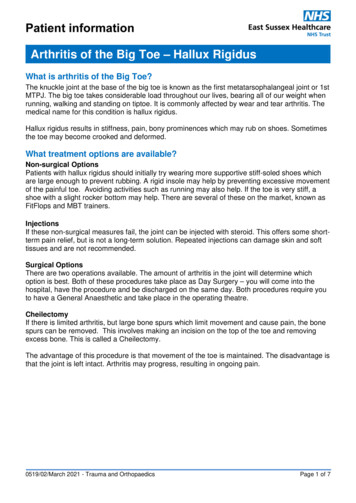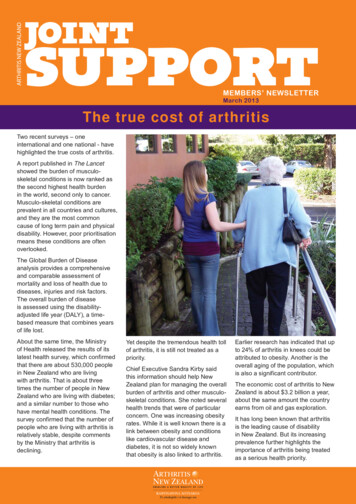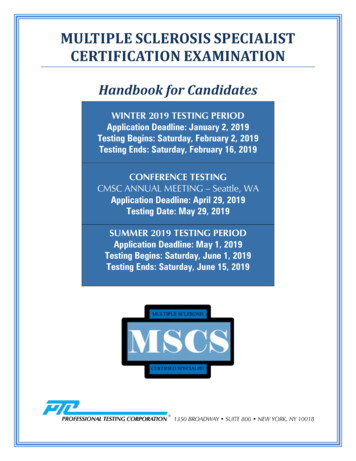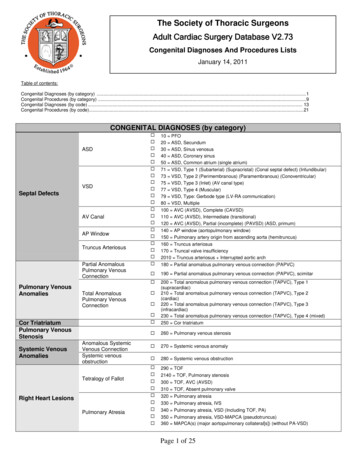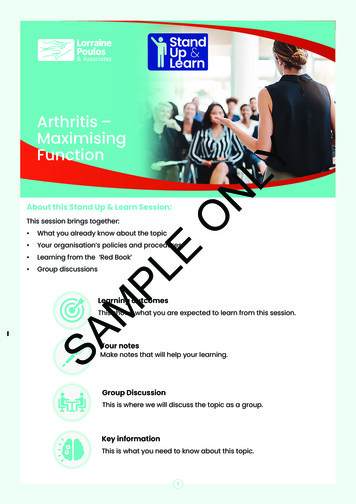
Transcription
Systemic sclerosis(scleroderma)
Systemic sclerosis information bookletContentsWe’re the 10 million people living with arthritis. We’re the carers,researchers, health professionals, friends and parents all united inour ambition to ensure that one day, no one will have to live with thepain, fatigue and isolation that arthritis causes.Barbara’s story4What is systemic sclerosis (scleroderma)?6What are the symptoms of systemic sclerosis?8How is systemic sclerosis likely to affect me?12How is systemic sclerosis diagnosed?14What treatments are there for systemic sclerosis?15Self-help and daily living20Research and new developments27Glossary28Useful addresses33Where can I find out more?34Talk to us35We understand that every day is different. We know that what worksfor one person may not help someone else. Our information is acollaboration of experiences, research and facts. We aim to give youeverything you need to know about your condition, the treatmentsavailable and the many options you can try, so you can make thebest and most informed choices for your lifestyle.We’re always happy to hear from you whether it’s with feedback on ourinformation, to share your story, or just to find out more about the workof Versus Arthritis. Contact us at content@versusarthritis.orgRegistered office: Versus Arthritis, Copeman House, St Mary’s Gate, Chesterfield S41 7TDRegistered Charity England and Wales No. 207711, Scotland No. SC041156.Page 2 of 36Words shown in bold are explained in the glossary on p.28.Page 3 of 36
We went on a skiing holiday in northern Italy, and becauseit was at high altitude that set things off. I became ill and wasstruggling to breathe. I had to be helicoptered to a hospital in atown called Bolzano.I was in this hospital in Italy for two-and-a-half weeks. It wasthere a doctor said: ‘Has anyone ever told you that you havescleroderma?’ I’d never heard of it before. It was quite a shock.They got me stabilised, so I could come back to England.I came back to the local hospital and was transferred to a renalunit in Manchester. I had a serious problem with my kidneys.Barbara’s storyMy symptoms started in July 2013. My fingers were swelling uplike crazy, and my ankles were swelling up so much I couldn’t seethem. No-one could tell me what was going on. I was referred to arheumatologist.Nothing was showing up in my bloods to indicate anything inparticular. But over the following few months, more and morestarted to go wrong.They did a biopsy on my kidneys and took me off my medication.I was there until they confirmed that fortunately I didn’t needa kidney dialysis. When they saw signs of improvement, I wasallowed home.I have good days and bad days. On a bad day, I’m very tired anddon’t want to do anything, and there can be pain. One of thebiggest ways it has affected me is my skin. It has made my skinextremely tight, and it gets shiny, itchy and painful. My skin isalmost normal again now.My treatment was quite aggressive early on, but it seemed tohave the desired effect. I had to give up work though. I was too illto continue at the time.It is easy to say, and difficult to do, but you have got to keep apositive mindset that you will get through the worst of it.I was having trouble walking and I was out of breath all the time.The walk from my car to work was too much, so my husbandwould drop me off right at the door. After Christmas, I hadanother blood test and something showed up.This is a tough condition, and if you’re prone to depression, thiscan make it worse. What really helps, is to talk to people. It helpsif you have a good supportive family around you, and I am luckyto have that.The rheumatologist said: ‘I think we have to put you on someimmunosuppressive drugs.’My husband Andrew and I get out for a walk on a daily basis. IfI’m sat around for too long, I stiffen up. And just being out in thefresh air, is good for the mind.versusarthritis.orgHelpline 0800 5200 520Page 4 of 36Page 5 of 36
Systemic sclerosis information bookletWhat is systemic sclerosis(scleroderma)?Most people with systemic sclerosis will only have mild symptoms.Rarely, it can cause serious problems with internal organs. Thesecomplications can be treated.Systemic sclerosis is a rare condition that can cause people’s skinand the connective tissue inside the body to harden.It’s important that potentially serious complications are spottedearly. You should therefore have regular check-ups with your doctor,preferably once a year.You can sometimes see signs of systemic sclerosis on the face, hands,feet and elsewhere around the body, as skin hardens and thickens.Systemic sclerosis can also cause connective tissue inside the bodyto become thick and hard.Connective tissue includes tendons, cartilage and blood vessels.Together they form a structure that supports joints and internalorgans and holds them in place.When skin and connective tissue hardens and thickens it becomeslike scar tissue from an injury or a burn.When systemic sclerosis causes connective tissue to harden this canstop muscles, blood vessels, joints and internal organs such as thelungs, working as well as they should.Systemic sclerosis is an autoimmune condition. This means that theimmune system, which protects you from illness and infection, getsconfused and attacks the body’s own cells.The word systemic means a condition that can affect the wholebody. Sclerosis means the hardening of a structure.Systemic sclerosis affects more women than men. It usually startsbetween the ages of 25 and 55, although it can occasionally start inchildren or in older people.There are different types of systemic sclerosis – diffuse and limited.Diffuse systemic sclerosis can affect skin all over the body and ismore likely to affect the internal organs.Limited systemic sclerosis is a milder form that only affects theskin on the face, lower arms, hands, lower legs and feet. It normallyprogresses slowly. Limited systemic sclerosis can affect the lungsand the digestive system too.Systemic sclerosis is not to be confused with a separate conditioncalled localised scleroderma, which just affects the skin. The wordscleroderma, which is an older term, specifically means hard skin(sclero hard, derma skin).The following information is about the condition systemic sclerosis,in which skin and connective tissue inside the body are affected.Page 7 of 36
Systemic sclerosis information bookletWhat are the symptomsof systemic sclerosis?Sensitivity to the cold(Raynaud’s phenomenon)Systemic sclerosis can cause symptoms affecting different parts ofthe body. The most common symptoms are described below.Figure 1. Symptoms of sclerodermaSymptoms ofsystemic sclerosisMany people have Raynaud’s without ever having systemic sclerosis.However, most people with systemic sclerosis will have symptoms ofRaynaud’s at some time during their illness.Jointor musclepain andstiffnessDigestive ProblemsSwallowing difficulties,heartburnversusarthritis.orgFingers or toes turn white then blue in the cold. Just walking into acold room or reaching into a fridge or freezer can make this happen.The colour returns to normal as the hands or feet warm up.Raynaud’s phenomenon is caused by a narrowing of the bloodvessels, which reduces the blood supply to the fingers or toes.Stressful situations can also cause the blood supply to reduce in thehands and bring on an episode of Raynaud’s.Increasedsensitivity to the coldFingers turn white then blue(Raynaud’s phenomenon)Changesin the skinStiffening,hardeningor tighteningof the skin,especially of thehands, face andfeet.Most people with systemic sclerosis develop an unusual sensitivityto the cold, known as Raynaud’s phenomenon.Page 8 of 36Raynaud’s is often the first sign that someone has systemic sclerosis.It can sometimes appear years before the onset of systemic sclerosis.Keep warm from top to toe –this will help open the bloodvessels to your arms, hands,legs and feet.Page 9 of 36
Systemic sclerosis information bookletChanges in the skinThe most common changes in the skin due to systemic sclerosis are: thickening and hardening of the skin on the hands, arms and faceswelling of the hands and feet, especially in the morningshiny skin, without its usual creasesstiffening of the facial skin, making it difficult to open the mouth widesmall red blood spots on the face, hands and arms.Less frequently, or later on in the condition, there may be: thinning of the lips thinning of the skin on top of the fingers and the soles of the feet peeling, cracking or open sores (ulcers) in the skin and flesh overthe fingertips, caused by poor blood supply white chalky lumps under the skin, caused by deposits of themineral calcium, often on the fingertips.Digestive problemsSystemic sclerosis can affect the digestive system, which isresponsible for swallowing food, breaking it down, and sending it todifferent parts of the body.We have a tube that takes food from the mouth to the stomach,called the oesophagus (o-soff-a-gus). Systemic sclerosis can causethe muscles in this tube to weaken, which can make swallowing difficult.Systemic sclerosis can cause heartburn, as a result of too muchgastric acid in this food tube. This acid is produced naturally in thestomach to help break food down.However, systemic sclerosis can cause this acid to leak upwardsfrom the stomach into the food tube. This can be unpleasant, and itisn’t good for us.versusarthritis.orgPage 10 of 36Most people with systemic sclerosis have some problems withswallowing or heartburn. Less often, other parts of the digestivesystem may be affected, leading to bloating, diarrhoea orconstipation.Pain or stiffness in the joints or musclesSystemic sclerosis can cause the tissues around joints to stiffen,which can reduce the range of movement of joints.It can also cause pain and swelling around affected joints.Muscle weakness is also sometimes a symptom of systemic sclerosis.People who have had systemic sclerosis for a long time may find thattheir joints can tighten into a bent position, because of the tighteningof the skin and tissues surrounding the joints.
How is systemic sclerosislikely to affect me?The skin symptoms can be the worst part of systemic sclerosis forsome people. While for other people, the digestive problems will givethem the most problems.Systemic sclerosis affects everyone differently, so it’s hard to sayhow it might affect you.Unfortunately, systemic sclerosis can sometimes cause peopleserious problems. These can include:This is a long-term condition, however the serious problems it cancause are rare. scarring of the lungs, causing shortness of breath and a dry cough narrowing of the blood vessels of the lungs, leading to high bloodpressure in the lungs, which may in turn strain the heart kidney problems resulting in high blood pressure.About one in five people with systemic sclerosis will also havesymptoms of another condition, such as lupus, Sjögren’s syndromeor inflammatory arthritis. These conditions will also need treatment.Most people find that systemic sclerosis affects just a few parts ofthe body and comes on gradually. It may slowly get worse but usuallysettles down to become stable after a few years.Sometimes systemic sclerosis may progress more quickly.For some people the symptoms can almost disappear after several years.versusarthritis.orgPage 12 of 36These problems are rare. However, it’s important you have regularcheck-ups with your doctor – preferably once a year – if you havesystemic sclerosis.The body is able to break down or repair extra scar tissue. Thismeans there may be some improvement in scarring – both in theskin and in other organs – once it becomes less active.Page 13 of 36
Systemic sclerosis information bookletIt’s important you have regular checkups with your doctor – preferably oncea year – if you have systemic sclerosis.How is systemic sclerosis diagnosed?There’s no single test for systemic sclerosis, and often it’s thethickening of the skin that will be a key reason why a doctor hasmade a diagnosis.However, your doctor will carry out tests that can be helpful infinding out whether other parts of the body are affected.What tests are there?Tests could include: blood testsx-rays and computerised tomography (CT) scansbreathing testsa heart scan, for example an echocardiogramstomach tests, for example an endoscopya skin biopsy, where a small piece of skin is removed andexamined under a microscope a capillaroscopy, which looks at the small blood vessels(capillaries) around the fingernails that are often affected bysystemic sclerosis.What treatments are there forsystemic sclerosis?There’s currently no cure for systemic sclerosis. However, there aredrugs that can help to control symptoms and treat any complications.There are many ways systemic sclerosis can affect the body. Therefore,the treatment you’ll need will depend on how the condition affects you.There’s also a lot you can do to help manage your condition, includingregular exercise, a healthy diet and a good skin care routine.Treating Raynaud’s phenomenonDrugs can help with the symptoms of Raynaud’s phenomenon byimproving circulation to the hands and feet.There are quite a few drugs available that can have this effect,including nifedipine and sildenafil, which can be taken as tablets. Youmay need to take more than one drug at the same time.In more severe cases of Raynaud’s, particularly where there arepainful ulcers that won’t heal, drugs such as iloprost can be given asan infusion. An infusion is a way of giving a drug as a drip into a vein,usually in a hospital.Drugs to treat Raynaud’s phenomenon work by relaxing the bloodvessels and increasing blood flow to the fingers and toes. They willalso have the same effect on blood vessels elsewhere in the body.Therefore, these drugs can cause side-effects such as skin flushing,headaches and swelling of the ankles.Infrared thermography uses technology to take images of what’shappening inside the body by showing heat spots. This can be usedto help make a diagnosis of systemic sclerosis. These tests are oftenonly performed at specialist centres.versusarthritis.orgPage 14 of 36Page 15 of 36
Systemic sclerosis information bookletTreating heartburn and swallowing difficultiesTo prevent heartburn and swallowing difficulties, your doctor mayrecommend antacids, a type of medication that can neutralise theacid produced in the stomach.These are usually very effective, although you may need to takethem for months or years.You may also be prescribed a drug called a proton pump inhibitor(PPI), which can reduce the amount of acid produced by the stomach.Treating other problems related to thestomach and digestive systemIf you have spells of constipation and diarrhoea, abdominalswelling, increased wind and discomfort, you may need to see agastroenterologist who specialises in this area.Some people also experience anal incontinence, meaning that theycan’t control their bowel motions properly so that small amounts ofstool slip out and can soil their clothes.This can be uncomfortable or embarrassing, and people maynot realise that it’s anything to do with systemic sclerosis. If thishappens to you, talk to your doctor and ask for a referral to agastroenterologist.Sometimes additional bacteria develop in the bowel, and this can betreated by drugs such as antibiotics.It’s important to have symptoms like diarrhoea and incontinencelooked at, to make sure that they don’t have another cause.versusarthritis.orgPage 16 of 36
Systemic sclerosis information bookletTreating painful and swollen jointsSteroid tablets to treat systemic sclerosisPainkillers and non-steroidal anti-inflammatory drugs (NSAIDs)should help to relieve joint pain and swelling.Steroid tablets can be used either in the early stages of systemicsclerosis when the skin is starting to look puffy, or later on if themuscles or lungs are affected.You can buy milder forms, such as paracetamol and ibuprofen, overthe counter at pharmacies and supermarkets. Your doctor will beable to prescribe stronger painkillers and NSAIDs if needed.Treating high blood pressure and kidneycomplicationsPeople with systemic sclerosis can sometimes have high bloodpressure, also known as hypertension. Severe cases can lead tokidney damage and strain on the heart.This is a serious complication known as a systemic sclerosis renalcrisis. It can be treated or prevented with drugs that help to controlthe blood pressure, especially ACE inhibitors.Treating lung and heart complicationsInflammation in the lungs can be treated with steroids ordisease-modifying anti-rheumatic drugs (DMARDs).High blood pressure in the lungs (pulmonary hypertension) is a rarecomplication of systemic sclerosis, but you’ll have regular tests tocheck how well your lungs and heart are working.If necessary, pulmonary hypertension can be treated with specificdrugs (including bosentan, ambrisentan, sildenafil or prostacyclin)that improve symptoms such as breathlessness.They’re usually given in low doses because high doses can raiseblood pressure and increase the risk of kidney problems.Steroid tablets are man-made forms of a hormone (cortisone) thatoccurs naturally in the body. They can be used to reduce swelling.Immunosuppressive drugs to treatsystemic sclerosisImmunosuppressive drugs target the immune system and may beused in more severe cases of systemic sclerosis, especially where theskin or lung disease is more extensive.These could include drugs which are known as conventionaldisease-modifying anti-rheumatic drugs (DMARDs).These drugs which have the effect of reducing the effectiveness ofan overactive and misfiring immune system, include methotrexate,ciclosporin, cyclophosphamide, mycophenolate and azathioprine.It will depend on how systemic sclerosis affects you as to whetheryou will be prescribed any of these drugs.The biological therapy rituximab is sometimes used to treat severecases of systemic sclerosis. Biological therapies are newer drugs thathave a more targeted approach. They reduce the effectiveness ofkey cells in the immune system that may be causing problems.Other drugs that may be used for lung and heart complicationsinclude: steroid tablets drugs to suppress an overactive immune system drugs used to treat blood pressure and cholesterol.versusarthritis.orgPage 18 of 36Page 19 of 36
Systemic sclerosis information bookletSelf-help and daily livingFor some of the symptoms of systemic sclerosis you will need to takedrugs. However, a healthy and balanced diet, exercising regularly anda good skin care routine are also important.ExerciseA regular exercise programme will keep your skin flexible, reduceany tightening in your joints and keep your blood moving freely.Although you may need to rest if your joints become swollen,it’s generally helpful to keep moving as much as possible.Regular stretching and range of movement exercises, should help toreduce tightness around the joints, particularly in the hands and wrist.A physiotherapist or a specialist hand therapist would be able toteach you the best exercises to keep your joints mobile. Theymay also suggest using splints to wear to help you look after yourhands and wrists.A physiotherapist might be able to give you special exercises to helpmaintain mobility in the muscles, connective tissue and skin in your face.A regular exercise programme willkeep your skin flexible, reduceany tightening in your joints andkeep your blood moving freely.versusarthritis.orgPage 20 of 36Diet and nutritionMaintaining a healthy diet is important as it may help Raynaud’ssymptoms and the healing of skin ulcers.However, digestive problems can make it difficult to keep up abalanced diet and to keep to your normal weight.If you have heartburn or difficulty in swallowing, the f
Most people find that systemic sclerosis affects just a few parts of . the body and comes on gradually. It may slowly get worse but usually settles down to become stable after a few years. Sometimes systemic sclerosis may progress more quickly. For some people the symptoms can almost disappear after several years.
